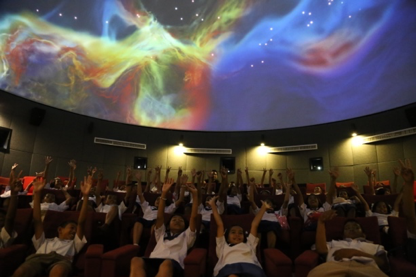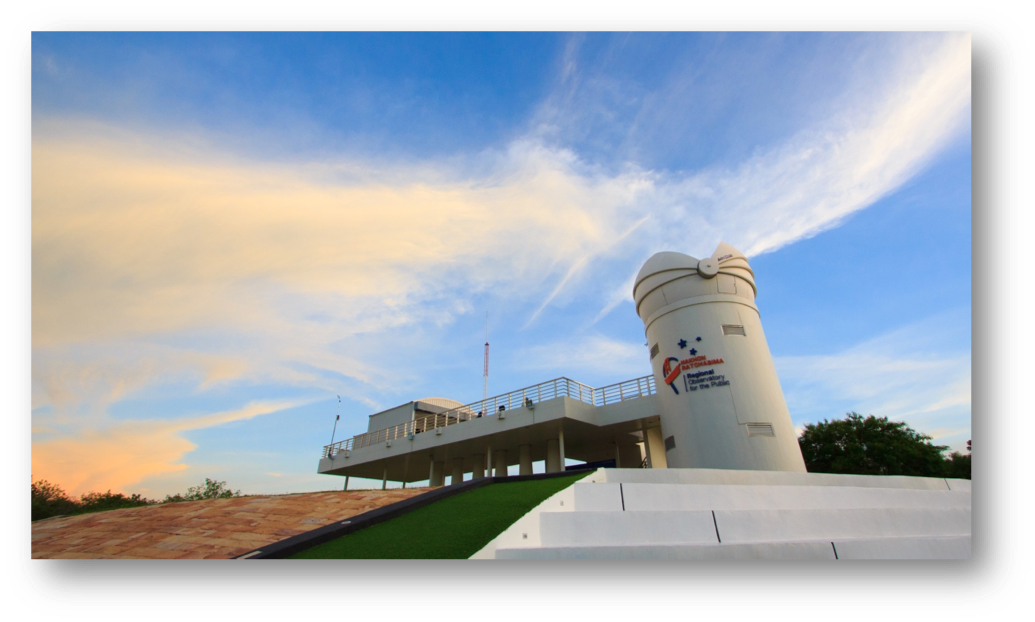
2. Regional Observatory for the Public, Nakhon Ratchasima
The National Astronomical Research Institute of Thailand (Public Organization), or NARIT, recognized the importance of the study of astronomy, so it established a regional observatory to be used as a learning center, conducting research in astronomy, and disseminating astronomical knowledge to educational agencies, schools, universities, and communities in order to provide them with accurate knowledge and understanding of astronomy that can be applied in teaching activities and daily life.
The Regional Observatory for the Public, Nakhon Ratchasima, is an observatory for the public and is the first full regional astronomy learning center in Thailand opened by NARIT, in the Ministry of Higher Education, Science, Research and Innovation. It provides academic services in astronomy to local and nearby people, supports teaching and learning in educational institutions and basic research, which create another major academic tourism attraction of the region.

The observatory’s exhibition hall has an interesting feature: Inside the building, there are 14 interactive astronomy exhibits that focus on learning the exhibits through the visitor’s own experience. The building, which is connected to the star projection, houses a rotating astronomy exhibition that presents hands-on and interesting astronomy. The star projection section is located at the back of the building and is equipped with a 10-meter-diameter star projection dome and a full-dome digital star projector with a resolution of more than 12 million pixels.
The Observatory Building: In front of the building is an open courtyard that can be used to set up a movable telescope or to support astronomical phenomena with a large number of visitors.
The building’s second floor is home to five high-resolution telescopes with diameters ranging from 5 to 14 inches. Aside from it is an open courtyard with a capacity of about 200 people for visitors who come to observe celestial objects above.
A shell-shaped fiberglass dome with a diameter of 18 feet that can be opened 180 degrees to observe the sky in all directions is located on the opposite side of the observatory building. It is another of Thailand’s most modern high-quality telescopes, a reflecting telescope with a diameter of 0.7 meters, the largest in the Northeast and the third-largest in the country. You can see Jupiter (the largest planet in the solar system), Saturn (the planet with the largest and most beautiful rings in the solar system), the Andromeda Galaxy (the galaxy closest to the Milky Way), and the Orion Nebula.

The Regional Observatory aims to educate and raise awareness and understanding of astronomy among the people in the region by organizing stargazing activities, observing celestial bodies, academic lectures, and astronomy-based activities, such as consulting and providing equipment for project work or astronomical research. It is open Tuesday-Sunday from 8:30 a.m. to 4:30 p.m., while telescope viewing activities are available on Saturdays from 6:00 p.m. to 8:00 p.m.
The planetarium service includes astronomical movie showtimes as well as live lectures by Astronomical Information Officers from the Nakhon Ratchasima Regional Observatory for the Public. These features, which draw visitors here, take place two times a day, Tuesday through Sunday, 11:00 and 3:00, for one hour each, with an additional round at 5:00 on Saturday.
In addition, it is also open for group reservations for schools, associations, and clubs that want to visit as a group, and they may contact staff on official days and hours.
Those who are interested in visiting and want to ask for more information can contact the observatory:
Regional Observatory for the Public, Nakhon Ratchasima, Suranaree University of Technology, 111 University Road, Suranaree Subdistrict, Mueang District, Nakhon Ratchasima 30000.
Tel: +66 4421 6254
FB: www.facebook.com/ropnma